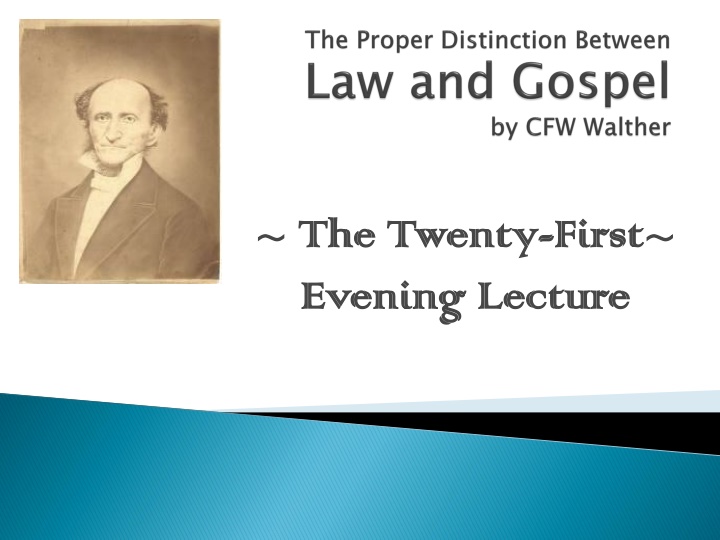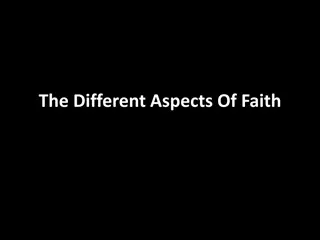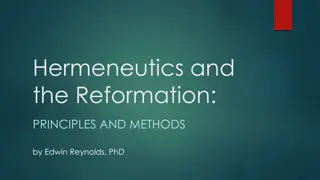Insights on Faith, Salvation, and Good Works in Christianity
The content discusses the application of faith and salvation, emphasizing the importance of upright living, virtues, and good works in true religion. It contrasts the belief that faith justifies a person with the Christian teaching that faith saves through the redemption by Jesus Christ. The text also highlights the misconception of faith as mere acceptance of truths without love and reformation. Overall, it provides intriguing reflections on faith, salvation, and righteousness in Christianity.
Download Presentation

Please find below an Image/Link to download the presentation.
The content on the website is provided AS IS for your information and personal use only. It may not be sold, licensed, or shared on other websites without obtaining consent from the author.If you encounter any issues during the download, it is possible that the publisher has removed the file from their server.
You are allowed to download the files provided on this website for personal or commercial use, subject to the condition that they are used lawfully. All files are the property of their respective owners.
The content on the website is provided AS IS for your information and personal use only. It may not be sold, licensed, or shared on other websites without obtaining consent from the author.
E N D
Presentation Transcript
~ The Twenty ~ The Twenty- -First~ Evening Lecture Evening Lecture First~
The Bible teaches that faith can be lost. It also teaches election to salvation. But these two teachings need to be applied differently. Why is that? If a person insulted me, then asked my forgiveness, but at the same time stated that he intended to continue insulting me, I would consider such a person insane! Walther says that is analogous to a sinner doing what? 2
True religion cannot consist in anything else than an upright life, the exercise of virtue and good works. What sin, they say, can there be in a person s failure to believe, something that is utterly contrary to his God-given reason? Men, they claim, will on that day not be asked what they have believed, but how they have conducted themselves. 3
The Father in heaven is especially pleased with a person s faith, because it is such a glorious work. Being a work, therefore, they can see no reason whatever why He should not be equally well pleased, for instance, with a person s charity, patience, fortitude, Justice, impartiality, truthfulness, and similar qualities. 4
Christianity teaches, on the contrary, that faith does not justify and save a person because is such a good work, but on account of the redemption accomplished by Jesus Christ, which faith apprehends. 5
In the sixth place, the Word of God is not rightly divided when the preacher describes faith in a manner as if the mere inert acceptance of truths, even while a person in living in mortal sins, renders that person righteous in the sight of God and saves him; or as if faith makes a person righteous and saves him for the reason that it produces in him love and reformation of his mode of living. 6
There can be no genuine faith without love, without a renewal of heart, without sanctification, without an abundance of good works. However, Walther emphasizes that renewal of heart, love, and the good works which faith produces, are not the justifying and saving element in a person s faith. 7
We are doing nothing, absolutely nothing, towards our salvation, but Christ has already done everything for us, and we must merely cling to what He has done. 8
Faith is only the hand with which we grasp what God offers. not having my own righteousness, which is from the law, but that which is through faith in Christ, the righteousness which is from God by faith; (Phil. 3:8-9 NKJ) But to him who does not work but believes on Him who justifies the ungodly, his faith is accounted for righteousness, (Rom. 4:5 NKJ) 9
By grace you are saved through faith and that not of yourselves it is the gift of God not of works lest any man should boast. 10
is still without the faith that justifies, is still blind, and is not walking in the way of salvation, but is headed straight for perdition! 11
These follow later, after he has received all that is necessary for his salvation. First a person is saved, then he becomes godly. First he must be made an heir of heaven, then he becomes a different person. 12
Luther says that the Christian religion is, in a word, a religion of gratitude. Everything has been given us: righteousness, our everlasting heritage, our salvation. All that remains for us to do is to thank God. We must be truly grateful to God, after having received eternal life, for all that we are and possess. Only works proceeding from gratitude are genuinely good works. For gratitude in this context one may substitute faith Walther means the same thing. 13
He rewards even the good works which He accomplishes in us. For the good works done by Christians are God s works. 14
That he could actually keep them. The Lord was simply answering the question of this person who was head over heels merged in self-righteousness. The sting had without question been driven home to him; he knew now that he did not love God above all things. 15
That is about as wise a statement as if I would say: An apple tree may be ever so good; but unless you add fruit to it, it is not an apple tree. Why, the reverse is true. Apples do not make an apple tree, but the apple tree produces apples. 16
As a noxious sect, which teaches that the mere mental perception of certain tenets justifies and saves men and lands them in heaven, no matter what kind of life they lead. In opposition to this view, Luther declares that if fides formata signifies the faith wrought by the Holy Spirit, this faith is a fruitful source of all good works; and if it is said that this faith justifies, he is in full harmony with the papists. 17
When they add the term formata to fides, they really mean works; for they say that a person is justified by faith if he has works in addition to faith. Their faith is worth no more than the imitation money used in a business college or the toy money of children, which looks like real money, but has no purchasing power. 18
When a poor Methodist or Baptist is in his final agony, he realizes that faith alone saves, and he dies saved when he takes refuge in the Lord Christ. But the dying papist has to think of purgatory and how long he may have to be confined in it because he lacks charity and good works. He has to consider himself lost. That was the devil s aim when he founded the Papacy. 19
Thus they rob faith entirely of its function. Luther: My love, or the works that follow after faith, neither give the proper form to my faith nor do they adorn it, but my faith gives love its proper form and adorns it. 20
Of course, faith must produce also good works! By adding the qualification, they have perverted and upset their whole preaching; for with that qualification all their preaching about grace and faith is futile and a wasted effort 21























